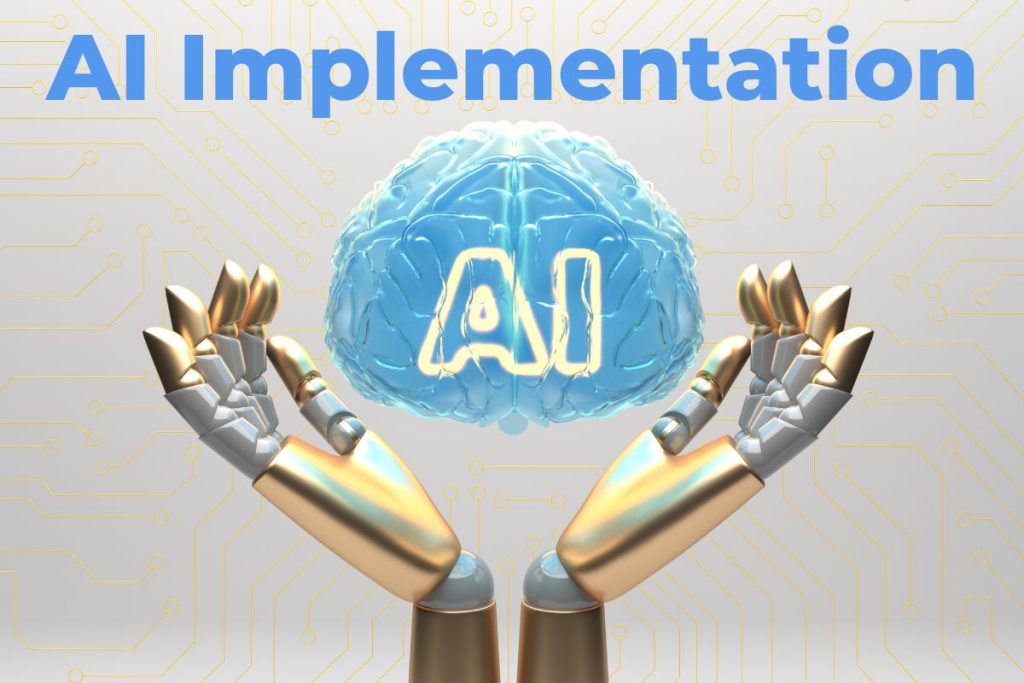Artificial intelligence is transforming the financial sector with no exception.
With the advent of cutting-edge technologies like artificial intelligence, machine learning, and data-driven algorithms, the workflow of financial intuitions is optimized, automated, and streamlined.
Financial firms or organizations need robust applications that use AI to capture data from various online resources for providing accurate credit scores to customers.
In this way, they can send customized advertisements for financial planning or investments that can benefit consumers in the long run. This can be done effectively with financial AI-enabled apps.
10 Financial institutions can be revolutionized with AI
In this blog, we will explore how AI implementation in the financial sector is revolutionizing the financial business landscape.

1. Enhanced Predictive Risk Assessment:
There are lots of risks involved in giving financial loans to consumers. Before making loans, financial institutions need to properly analyze these risks.
The evaluation of the risks can be done effectively with the help of AI-powered financial risk assessment software that can analyze different financial risks, help in the identification of vulnerable risks, categorize them on the basis of financial impact and severity, and mitigate them with actionable tasks.
Using artificial intelligence, we can eliminate the risk of human error and ensure that financial decisions are taken as per the norms and conditions of financial organizations and government authorities.
Related: Benefits of Implementing AI in the Pharmaceutical Industry
2. Intelligent Fraud Detection:
Fraud prevention is a crucial concern for financial institutions. Thanks to AI, institutions can now significantly improve their fraud detection capabilities.
AI algorithms can scrutinize large datasets, detect patterns, and identify anomalies that are usually missed by human analysts. By leveraging machine learning models and advanced pattern recognition, AI actively detects suspicious activities, quickly raises red flags, and significantly reduces the rate of fraudulent transactions.
To ensure that financial intuitions are capable of detecting financial fraud beforehand, we should make use of intelligent AI-powered fraud detection applications.
Related: Pros and cons of AI implementation in social networking sites
3. Personalized Customer Experience:
AI plays a pivotal role in transforming how financial institutions engage with their customers. Through the integration of chat bots and virtual assistants, AI enables banks to provide personalized customer support 24/7.
By understanding customers’ preferences and behaviors, AI algorithms can offer tailored financial advice and recommend relevant products and services.
This not only enhances customer satisfaction but also helps institutions build stronger relationships, resulting in increased customer loyalty.
Read: 10 ways to integrate Adaptive Artificial intelligence in your business
4. Streamlined Operations and Cost Reduction:
Financial firms or banking operations involve complicated tasks that involve mathematical computation, data storage for customer’s accounts, and real-time credit scoring by consumers.
These tasks cannot be done manually in the current financial business landscape, where technology is evolving at the fastest pace.
It is essential that financial organization workflows are optimized, communication processes between consumers and financial experts are improved, and financial processes are streamlined.
This is possible with the cost-effective implementation of an AI strategy. In this regard, AI consultants can help financial business owners analyze their financial business models and optimize workflows in efficient ways.
Read: The role of AI consultants in workflow optimization in modern business
5. Algorithmic Trading:
AI’s impact on the financial sector is particularly evident in the realm of algorithmic trading. By analyzing vast amounts of historical and real-time data, AI algorithms can predict market trends, monitor key indicators, and execute trades automatically.
Financial trading uses complicated algorithms that can be modernized with the help of artificial intelligence. We can accurately predict market fluctuations using predictive trading analytics tools that are AI-powered, which maximizes profit for customers.
However, it is important that appropriate ethical practices are adopted, and regulatory compliance must be in place to prevent market abuse.
Read: 10 Ways Artificial Intelligence is Reshaping the Education Sector
6. Operational Efficiency and Cost Reduction:
AI implementation streamlines numerous operational processes within financial institutions, leading to significant cost reductions.
Human resources can concentrate on more complicated and value-added activities because robotic process automation (RPA), powered by AI, handles routine, repetitive tasks.
This not only enhances efficiency but also reduces operational costs, contributing to a leaner and more agile organizational structure.
Read: Top 10 Benefits of AI for Advanced Cyber security in Modern Businesses
7. Automated Financial Decision-Making:
AI-powered algorithms excel at processing vast amounts of data and deriving actionable insights. In financial institutions, this capability is harnessed to automate decision-making processes.
AI-driven credit scoring models, investment recommendations, and risk assessments enable quicker and more accurate decisions, optimizing resource allocation and enhancing overall operational efficiency.
8. Block chain and AI synergy:
The combination of AI and blockchain technology holds transformative potential for financial institutions.
AI can enhance the security and efficiency of block chain networks, providing intelligent insights into transaction patterns and anomaly detection.
Smart contracts, powered by AI, can automate and streamline complex financial agreements, reducing the need for intermediaries and increasing the transparency and speed of transactions.
Read: 15 Benefits of implementation of AI Banking solutions
9. AI-Powered Regulatory Compliance:
Financial organizations or firms must adhere to the sets of rules and regulations of the state and central government.
That is why it becomes essential for financial company owners to ensure that their employees adhere to ethical practices and do not engage in malpractices or non-compliance that can cause huge penalties, loss of reputation and trust in the company in the market, and create havoc in the minds of consumers.
Using AI-enabled financial solutions, we can easily identify compliance-related issues and help employees or managers resolve them before it is too late.
Read: Benefits of AI implementations in Manufacturing Industry
10. Algorithmic Credit Scoring:
Traditional credit scoring models often rely on historical financial data, which may not fully capture an individual’s creditworthiness. AI introduces a paradigm shift with algorithmic credit scoring.
Machine learning algorithms assess a broader set of variables, including non-traditional data sources, social behavior, and transaction patterns. This holistic approach enhances the accuracy of credit assessments, opening up financial opportunities for a more diverse clientele.
Conclusion:
AI implementation in the financial sector is revolutionizing traditional practices, enabling institutions to operate more efficiently and intelligently.
From risk assessment to fraud detection, personalized customer experience, streamlined operations, and algorithmic trading, AI enhances decision-making processes and empowers financial institutions to stay ahead of the curve.
As the era of AI moves forward, it is essential for financial institutions to embrace and harness its power responsibly, ensuring a secure and prosperous future for the industry.




